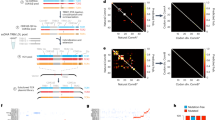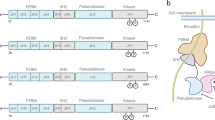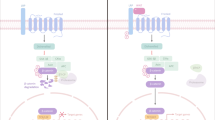Abstract
Basic Fibroblast Growth Factor (bFGF/FGF2) is thought to play a decisive role in malignant progression. Aberrant expression of bFGF causes constitutive autocrine activation of its cognate receptor and autonomous growth of human melanoma cells or bFGF transformed fibroblasts in culture. It remains to be determined, however, whether the endogenous bFGF confers growth advantage to tumors and what are the downstream targets of the activated FGF receptor critical for its transforming capacity. We therefore transfected metastatic melanoma cells and bFGF transformed mouse fibroblasts with a dominant-negative mutant of the murine FGF receptor 1 (fgfr1/flg), comprising the extracellular and transmembrane domains but lacking the intracellular kinase domain (dnflg). Reverse transcriptase-PCR, 125I-bFGF binding and affinity labeling analyses show that the truncated receptor is targeted to the membrane and is expressed at much higher levels than the endogenous receptor in all of the selected clones. Expression of the dnflg dramatically reduces the basal as well as bFGF induced growth of these cells in vitro and also suppresses their tumorigenic potential in nude mice. The expression of the dnflg does not significantly alter the general level of tyrosyl-phosphorylated proteins in the trunsduced melanoma cells. Rather, a major downstream affected target is a Src-family kinase, whose activity, determined by an in vitro immune kinase assay, is stimulated in normal melanocytes by exogenous bFGF, and is markedly reduced in the dnflg-expressing melanoma cells. The present study demonstrates that direct interference with the activity of FGF receptors has a deleterious effect on cell proliferation and survival in vitro and in vivo leading to the suppression of melanoma tumor progression possibly through the inactivation of a Src-family kinase.
This is a preview of subscription content, access via your institution
Access options
Subscribe to this journal
Receive 50 print issues and online access
$259.00 per year
only $5.18 per issue
Buy this article
- Purchase on Springer Link
- Instant access to full article PDF
Prices may be subject to local taxes which are calculated during checkout
Similar content being viewed by others
Author information
Authors and Affiliations
Rights and permissions
About this article
Cite this article
Yayon, A., Ma, YS., Safran, M. et al. Suppression of autocrine cell proliferation and tumorigenesis of human melanoma cells and fibroblast growth factor transformed fibroblasts by a kinase-deficient FGF receptor 1: evidence for the involvement of Src-family kinases. Oncogene 14, 2999–3009 (1997). https://doi.org/10.1038/sj.onc.1201159
Received:
Revised:
Accepted:
Issue Date:
DOI: https://doi.org/10.1038/sj.onc.1201159
Keywords
This article is cited by
-
Sensitivity of Melanoma Cells to EGFR and FGFR Activation but Not Inhibition is Influenced by Oncogenic BRAF and NRAS Mutations
Pathology & Oncology Research (2015)
-
A phase I study of E7080, a multitargeted tyrosine kinase inhibitor, in patients with advanced solid tumours
British Journal of Cancer (2012)
-
Fibroblast Growth Factor Receptors as Therapeutic Targets in Human Melanoma: Synergism with BRAF Inhibition
Journal of Investigative Dermatology (2011)
-
Csk-binding protein (Cbp) negatively regulates epidermal growth factor-induced cell transformation by controlling Src activation
Oncogene (2006)
-
FGFR4 Arg388 allele correlates with tumour thickness and FGFR4 protein expression with survival of melanoma patients
British Journal of Cancer (2006)



